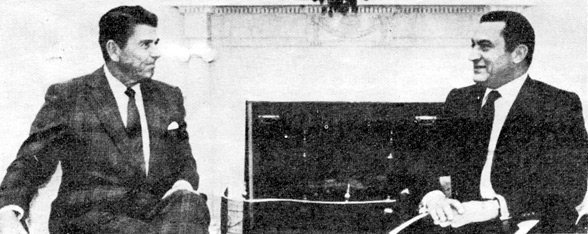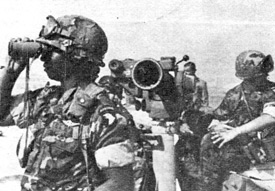
Egypt after Sadat:
ISRAELI WITHDRAWAL AND U.S. HEGEMONY
by Our Diplomatic CorrespondentFollowing the death of Egypt's dictator Anwar Sadat, which was unlamented except in Israeli and Western imperialist circles, the Egyptian people adopted a "wait and see" attitude towards Egypt's new ruler, Husni Mubarak. He did not come to power through a democratic process but through a rigged "referendum" of the type for which Sadat had become notorious, a farcical process in which the ruler invariably declares himself to have received over 99% of the votes.
Nevertheless, despite this rather unpromising start, the Egyptian people have decided to give their new President a chance to prove himself and suspend their judgement of him until the effects of his policies become clearly apparent. Since the Egyptians are the people most immediately affected, it is understandable that many other quarters, including most Arab governments, have also decided to wait and see.
What After April 1982?
One point that many of these quarters have made is that Husni Mubarak does not have many options open to him before April 1982, when the withdrawal of Israeli forces from Sinai is scheduled to be completed. The option of scrapping the Camp David agreements, it is argued, is not practical before that date, because if President Mubarak chose such a course, he would throw away the one positive aspect of Camp David, while many of the negative aspects would remain. To deny Egypt the one advantage of regaining Sinai, after all the humiliating concessions Sadat has made in its name, could expose an Egyptian ruler to the accusation of irresponsibility.

This argument has some logic in its favour, although it ignores the American-sponsored "multinational peacekeeping force" which will take up positions in Sinai when the Israelis withdraw. The practical effect of this will be that, instead of being occupied by the Israelis, Sinai will be under the occupation of several Western imperialist powers, led by the United States. It is doubtful whether this represents a gain for the Egyptian people, or whether it will give President Mubarak an option of reversing his Camp David policy after April 1982, as some people fondly hope.
Many quarters have posed the question of whether Israeli Prime Minister Begin will, for once, honour his word and in fact complete the withdrawal from Sinai according to the Camp David formula. Certainly, the Zionists would be very pleased to find an excuse for remaining in as much of Sinai as possible, and Husni Mubarak has been very careful not to give them such an excuse.
The agitation by Zionist settlers in Sinai about the amount of compensation they should receive if they leave, and even their threats to use violence, in fact strengthen Begin's hand. For if the Israeli withdrawal is completed, he will be able to portray himself in a more honourable light as "a leader who kept his word even in the face of fierce opposition". He will thus try to claim that he was doing the Egyptian government a great favour by withdrawing from its territory.
While accepting that it is still early to pass a final verdict on the policies of Egypt's new President, since he has only had about three months in power, it is nevertheless permissible to look at the policies he has followed so far during those three months, as these may contain indications of how he will act in future.
Cosmetic Changes
It is possible to say that his policies so far do not look identical to those of Sadat, in that he has introduced some changes, which fall under three headings. First, the Egyptian news media have been ordered to stop the vitriolic attacks against other Arab countries which were a hallmark of Sadat's rule. Secondly, some of those people detained without trial by Sadat for political reasons, including a number of influential critics of his regime, have been released. Thirdly, Husni Mubarak's regime has made it known that it will discourage some of the more flagrant aspects of Sadat's "open-door" economic policy, including the ostentatious flaunting of wealth by the privileged few, which aroused the resentment of the vast majority of Egyptians who live in poverty.
All of these changes are cosmetic in nature and have not altered the essential principles on which the Sadat regime was based. These are adherence to the Camp David formula and alliance with Israel, the alignment with U.S. imperialism, the adoption of capitalism and undermining of the socialist reforms introduced by the late President Nasser and, last but not least, the denial of democratic rights and establishment of a personal dictatorship. Until some or all of these fundamental aspects of Sadat's rule are abandoned, it will not be possible to say that any real change has occurred in Egypt.
The Background to Husni Mubarak's Accession
On assuming office, President Mubarak declared that he was fully informed in advance of all Sadat's moves to reach a separate agreement with Israel, and that he gave them his total support. He has also stressed on a number of occasions that he will continue the general course charted by his predecessor.
The circumstances of Husni Mubarak's accession contained indications of the degree of confidence the U.S. rulers placed in him. Reliable Western diplomatic sources said that, after Sadat's death, the U.S. government sent a large number of C.I.A. operatives to Egypt to help the Egyptian Mukhabarat (secret police) to suppress any form of opposition to the regime. Not that this should cause the Egyptian opposition undue worry, judging from past C.I.A. performance. In late September 1981, C.I.A and Mukhabarat operatives uncovered a plot to assassinate Sadat, and, satisfied with their brilliant achievement, assured him that he would be quite safe at his military parade on October 6, 1981. They overlooked the possibility of a second plot which they had not uncovered, and which in fact was successful in assassinating him on that date.

Shops were looted by police in Asyut following
October riots.
Furthermore, the Reagan administration sent its Secretary of State Alexander Haig to Egypt shortly after Sadat's death, ostensibly to attend the funeral. The real reason for his visit, according to Western diplomats, was to ensure the smooth succession to Husni Mubarak and foil any attempts to install someone else in the Egyptian Presidency. The Americans appear to have feared the possibility of a palace coup within the regime.
While in Egypt, Haig held discussions with both Husni Mubarak and Sudanese President Jaafar Numeiry on the planned "Bright Star" manoeuvres and an emergency plan to transport Egyptian troops and U.S. military advisers to Sudan on American aircraft if the need arose.
The Significance of the "Bright Star" Manoeuvres
The manoeuvres carried out shortly after Sadat's death by U.S. forces in Egypt, Sudan, Somalia and Oman under the code name of "Bright Star" have had extremely important results. This is the opinion of American military observers in Sinai, according to reliable information reaching Palestine. These manoeuvres, particularly the operations of the U.S. Rapid Deployment Force in landing and capturing and holding positions of a potential enemy in desert terrain, as well as the non-stop flight of B-52 bombers from the U.S.A. to Egypt for precision bombing of targets there and the use of AWACS surveillance aircraft, were all regarded as highly successful by American military specialists.
Most significantly, the analysis of these manoeuvres will be used as a basis for planning possible options of U.S. military intervention in Gulf countries. Some Gulf diplomats express concern that Saudi Arabia would be a prime target for this sort of action if the situation there develops in a way the U.S. rulers consider dangerous to their interests. Planning for the eventuality of a U.S. invasion in the Gulf is already being prepared on the basis of the "Bright Star" results, not only by the U.S. military authorities but also by C.I.A. headquarters. In an attempt to justify the need for such plans, the Pentagon quotes the example of the situation in Iran, when the United States could not make any effort, particularly in the military field, to control the situation before the Shah fell. To make the argument even more persuasive for other branches of the Reagan administration, the Pentagon also raises the spectre of an alleged "Soviet military invasion" in areas of vital U.S. interests, namely the oil states.

U.S. troops in Egypt looking for military bases in
the Middle East.
Thus, if the U.S. rulers consider a situation dangerous, the Pentagon argues that they must be prepared to make a preemptive strike and to occupy those territories of vital interest to them. The choice of the territories of Egypt, Sudan, Somalia and Oman was considered necessary in order to train the troops in the very territories where there is a real possibility that military actions may take place, so that American forces would be fully prepared and aware of the situation and terrain in these countries. The U.S. administration, particularly since President Reagan came to power, has agreed to prepare these plans, particularly for ready preemptive measures in the event of the U.S. rulers considering that the situation has become dangerous to them, without consulting any other state, even those allied to them in Europe or the Arab World, on the pretext that this is the best way to preserve secrecy.
C.I.A. Threat Even to America's Allies
The most sinister aspect of all this, as far as Arab regimes friendly to the United States are concerned, is the role of the C.I.A. in planning these operations. While the "Bright Star" manoeuvres were held in countries whose regimes are unstable now or likely to become so in the foreseeable future, to prepare for military operations to help these regimes keep in power in periods of internal instability, the participation of the C.I.A. in planning on the basis of the results of "Bright Star" implies also an alternative to this. If the U.S. rulers consider that it is no longer in their interests to keep one of these regimes in power, they will replace it with another regime that is a more convenient puppet. One has only to recall the example of the former King of Greece, or the even more gruesome example of Ngo Dinh Diem in the southern part of Vietnam, to see that the U.S. rulers are quite prepared to sacrifice ever their most loyal puppets if it suits their interests.
The American plans being prepared, according to well-informed military experts, include covert C.I.A. operations before and during an American invasion in the Gulf, particularly if the decision is taken to change any of the regimes there in order to ensure the pro-Western character of their rulers. This would be done when U.S. policymakers consider that these regimes are not stable enough to protect U.S. interests, or if they do not toe the line sufficiently and try to adopt an independent policy.
In such an eventuality, the C.I.A. would work to overthrow the regime concerned and replace it with a regime that serves U.S. interests but poses as a bourgeois democracy or an Islamic democracy. The ruling apparatus in the United States, specifically the C.I.A. and the State Department's intelligence analytical and research unit, is at present conducting an intensive study of the history, laws and practice of Islam in order to distort it to serve American interests. So far, the Reagan administration feels, the U.S. leadership's ignorance of Islam has placed it in a weak position, and it now wishes to use a distorted form of Islam to fight real Islamic revolutionary forces.
The above facts enable us to place the Mubarak regime in Egypt in a clearer perspective. So far, it has maintained the broad lines of Sadat's policies, introducing only minor changes. In particular, it was host to the first phase of the "Bright Star" manoeuvres and has continued to collaborate with U.S. imperialism. It can be argued that at present it has no choice until the Israeli withdrawal from Sinai is completed, although the corollary to this, namely that Husni Mubarak will change his policies afterwards, seems rather feeble.
In other words, once the Israelis have left Sinai and it has been occupied by the U.S.-sponsored multinational imperialist force, will he dare, or be in a position, to put his loyalty to Islam and the Arab nation first, to cut his regime's links with the enemies of Islam and the Arab nation, notably the U.S. rulers, and become a patriot? Time will tell, but he will need a miracle if he is to do this successfully. Miracles, as I have said, are rare.
Contact us: New Jersey Solidarity - Activists for the Liberation of Palestine
(973) 954-2521
info@newjerseysolidarity.org
http://www.newjerseysolidarity.org
New Jersey Solidarity
344 Grove Street, Suite 131
Jersey City, NJ 07302